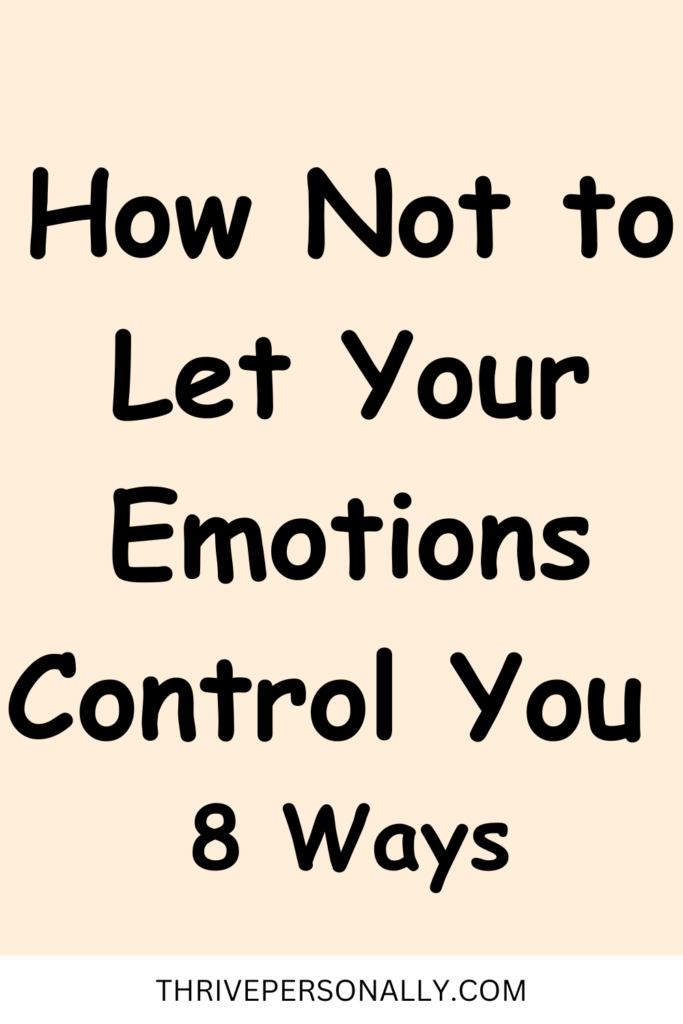Emotions are complex reactions that the body has to certain stimuli. They can range from feelings of joy, sadness, anger, fear, and love, to a myriad of other nuanced states. Understanding emotions is crucial because they can heavily influence your thoughts and actions throughout your daily life.
Each emotion serves a purpose, often signaling to you when something is right or when something needs attention. For instance, you might feel happy when achieving a goal, which encourages you to pursue more activities that bring you joy.
Recognizing the impact of emotions on your mindset is essential for personal growth. Emotions not only drive your behavior but also shape your perception of the world around you. For example, if you frequently feel anxious, it may lead to avoidance of certain situations, thus limiting your experiences.
By understanding your emotions better, you can begin to differentiate between healthy and unhealthy emotional responses. Healthy emotions might involve expressing sadness through tears when you lose something important, while unhealthy responses could include repressing these feelings, causing them to manifest in detrimental ways later on.
How Not to Let Your Emotions Control You
1. Recognizing Emotional Triggers
Emotional triggers are situations, people, or events that can provoke strong feelings in you. Recognizing these triggers is essential in managing your emotional responses effectively. Often, you may feel upset, anxious, or even angry without fully understanding why. This lack of awareness can create a cycle in which your emotions dictate your actions. By identifying what specifically triggers your emotions, you empower yourself to take charge of your responses.
To begin, reflect on instances where you have experienced intense emotions. Consider the context of these situations. Was it a conversation with a friend, a stressful work environment, or perhaps an unexpected change in plans? Keeping a journal can be helpful in this process. Write down your feelings, the events that led to those feelings, and any patterns you notice over time. This practice allows you to track your emotional responses and provides clarity on what may serve as a trigger.
In addition to reflecting on your own experiences, it can be beneficial to pay attention to how others react in various situations. Sometimes, witnessing another individual’s emotional response can help you draw parallels with your own experiences. You may find that your triggers are similar, revealing common themes or patterns. Understanding these emotional triggers not only enhances your self-awareness but can also improve your relationships as you become more empathetic towards the emotional responses of others.
Read Also: 10 Ways to Improve Your Emotional Intelligence
2. The Power of Pause
In moments of intense emotion, it can be tempting to react immediately. However, it is essential to understand the power of pause. When you encounter strong feelings such as anger, sadness, or excitement, taking a moment to step back can significantly influence your response. This is where mindfulness comes into play. By practicing mindfulness, you give yourself the opportunity to observe your feelings without immediately acting on them.
Mindfulness involves being present in the moment and acknowledging your emotions without judgment. One effective way to practice this is through deep breathing. When you feel overwhelmed, pause for a few seconds to take deep breaths. Inhale through your nose, allowing your chest and stomach to rise, and then exhale slowly through your mouth. This simple act can help you ground yourself, bringing clarity to your thoughts.
Another technique is to count to ten before responding to any emotionally charged situation. This brief pause allows you to gather your thoughts and reflect on how best to approach the situation. You might find that after a short break, your perspective has shifted, leading to more thoughtful and effective communication.
For example, if someone criticizes you harshly, instead of responding immediately with defensiveness, you could take a moment to absorb the feedback. This pause can help you respond more constructively rather than reacting out of frustration. Remember, the goal is not to suppress your emotions, but to create space for more rational decision-making.
Read Also: 10 Effective Coping Skills for Managing Tough Emotions
3. Practicing Deep Breathing Techniques
When you find your emotions starting to take over, practicing deep breathing techniques can be a simple yet effective way to regain control. These exercises can help calm your mind and body, allowing you to react to situations more thoughtfully rather than impulsively. You may be surprised by how much a few moments of focused breathing can help you manage your feelings.
To start, find a comfortable position, either sitting or standing. Take a deep breath in through your nose, allowing your abdomen to expand fully. As you inhale, count slowly to four. Holding that breath for a moment is essential, so count to four again before slowly exhaling through your mouth for a count of four. This method, often referred to as the 4-4-4 technique, can significantly ease tension in your body and mind.
Practice this exercise whenever you feel overwhelmed by emotions, whether in a stressful meeting, while driving, or even during conversations. Deep breathing allows you to introduce a pause, giving you time to collect your thoughts. As you continue to practice these breathing techniques, you will likely find that they become more natural, leading you to consistently feel more in control of your emotions.
Read Also: 15 Life-Changing Benefits of Journaling
4. Writing It Out
One effective way to manage your emotions and gain clarity is through journaling. Writing your thoughts and feelings can be a powerful tool, allowing you to process your emotions rather than letting them control you. When you put pen to paper, you create a safe space to express what you are experiencing. This practice can help you understand your emotions more deeply and reduce feelings of anxiety or overwhelm.
If you are interested in starting a journal, it’s important to find a method that feels right for you. You can begin by setting aside a specific time each day or week to write. It doesn’t have to be long; even a few sentences can make a difference. You might start by writing down what happened during your day, how you felt about it, or any thoughts that surfaced. Over time, you may find it beneficial to focus on specific emotions, such as frustration or joy, and explore them further in your writing.
To make journaling more effective, consider asking yourself guiding questions. For example: What triggered my current feelings? How did I respond emotionally? What can I learn from this experience? These questions can lead you to insights that help you understand your emotional responses better. Additionally, don’t hesitate to include both positive and negative feelings; acknowledging the full range of your emotions is crucial for developing emotional control.
As you journal regularly, you may notice patterns in your feelings and thoughts. This awareness can empower you to make conscious decisions in how you react to your emotions. The more you write, the better equipped you will become in not allowing your feelings to dictate your actions. Journaling is not just an outlet; it is a pathway to emotional clarity and control.
5. Talking It Out with Someone
When you find yourself overwhelmed by your emotions, it can be incredibly helpful to talk things out with someone you trust. This could be a close friend, family member, or even a mentor. Having a support system is essential in managing your feelings effectively. Speaking about your emotions allows you to express what you are going through and, importantly, to receive support in return. You might be surprised at how much lighter you feel after sharing your thoughts with someone who listens and understands.
To make the most of these conversations, choose someone who you believe will be genuinely supportive and nonjudgmental. It is important that this person makes you feel safe, allowing you to speak openly about your emotions without fear of criticism. When you approach someone, consider setting the tone by expressing your needs upfront. You can say something like, “I need to talk about what I’m feeling right now, and it would mean a lot to have your support.” This gives the other person clarity on how they can help you best.
During these discussions, aim to articulate your feelings clearly. You might want to use “I” statements to express how certain situations or feelings affect you personally. For example, instead of saying, “You never listen to me,” consider saying, “I feel unheard when I try to share my feelings.” This approach fosters understanding and encourages a two-way conversation. As you engage in these meaningful exchanges, remember that listening is just as important as speaking. Be open to what the other person has to say, as their insights can help you gain perspective on your emotions.
Talking it out can create a sense of collaboration in managing your feelings. It facilitates a deeper connection with the listener and reassures you that you are not alone in your struggles. Building these supportive relationships can empower you to navigate your emotions more effectively, fostering resilience in the face of challenges.
6. Finding Healthy Outlets for Emotions
It is essential to find healthy outlets for your emotions to prevent them from taking control of your life. Emotions can often feel overwhelming, but channeling them into constructive activities can greatly improve your mental well-being. One effective way to manage your feelings is through physical activities. Engaging in sports, whether it’s running, cycling, or team sports, allows you to release pent-up energy and fosters a sense of accomplishment. Physical activity stimulates the production of endorphins, which can help elevate your mood and reduce stress.
Artistic endeavors provide another excellent outlet for emotional expression. Activities such as painting, drawing, or crafting can help you convey your feelings visually, promoting a deeper understanding of your emotions. Not only do these creative hobbies allow you to express yourself, but they also encourage mindfulness, helping you stay present in the moment. If you’re not sure where to start, consider taking a class or watching online tutorials to inspire your creativity.
Music is another powerful medium for emotional expression. Whether you play an instrument, sing, or simply enjoy listening to your favorite songs, music can evoke strong feelings and provide solace in difficult times. Creating playlists that reflect your mood or writing your own songs can be particularly therapeutic. You might also find comfort in joining a local band or choir, where you can connect with others who share your passion.
7. Developing Emotional Resilience
Emotional resilience refers to your ability to adapt to stressful situations and bounce back from challenges, helping you maintain emotional stability even in tough times. It’s important to understand that being emotionally resilient does not mean you will not experience negative emotions; rather, it means you have the skills to manage those feelings effectively. To develop emotional resilience, you can focus on several key strategies that are both practical and beneficial.
Firstly, practicing self-awareness is vital. When you understand your emotions, it becomes easier for you to recognize triggers and patterns that affect your mood. Take time to reflect on what situations make you feel overwhelmed and how you typically respond. Journaling or discussing your feelings with someone you trust can be excellent ways to increase this awareness.
Another important strategy is fostering a strong support network. Surrounding yourself with supportive friends and family helps create a buffer against emotional struggles. When you face tough times, having someone to talk to can reassure you and provide different perspectives that may help in processing your feelings.
Additionally, adopting a solution-focused mindset can significantly contribute to emotional resilience. Instead of dwelling on negative outcomes, try to reframe your thoughts toward possible solutions. This cognitive shift encourages you to focus on what you can control, thus minimizing the feeling of helplessness.
Lastly, engaging in self-care activities is essential for your emotional well-being. Activities such as exercise, hobbies, and mindfulness practices can help reduce stress and improve your mood. By taking care of your physical and mental health, you are equipping yourself with the tools needed to navigate emotional challenges more effectively.
8. Staying Consistent and Patient
Managing your emotions effectively is a journey that requires both consistency and patience. As you delve into this personal development process, it is crucial to set realistic goals for yourself. Rather than aiming for immediate perfection, break down your larger objectives into smaller, manageable tasks. This helps create a clear path and gives you a sense of direction, making the process feel less overwhelming.
For example, if your goal is to react more calmly in stressful situations, start by identifying one specific scenario where you typically struggle. Then, focus on practicing a calming technique, such as deep breathing or counting to ten, during that specific instance. This way, you can dedicate your efforts to small, daily changes rather than attempting to transform your entire emotional landscape at once.
It’s essential to celebrate your small victories along the way. Each time you successfully manage your emotions in a challenging situation, take a moment to acknowledge and reward yourself. This could be as simple as recognizing your achievement mentally or treating yourself to something enjoyable. Celebrating these milestones reinforces positive behavior and can motivate you to maintain your progress.
Additionally, remind yourself that setbacks are a normal part of this process. There will be days when you feel like you are struggling to maintain control over your emotions. When this happens, practice self-compassion. Understand that growth takes time, and emotional regulation is a skill that develops with practice. Instead of becoming frustrated, reflect on what you can learn from the experience and strategize how to approach similar situations differently in the future.
By staying consistent and patient, you create a solid foundation for managing your emotions more effectively. As you navigate this journey, remember that it is entirely natural for progress to be gradual. Embrace the process, keep your goals in sight, and remain committed to your emotional well-being.
Save the pin for later



